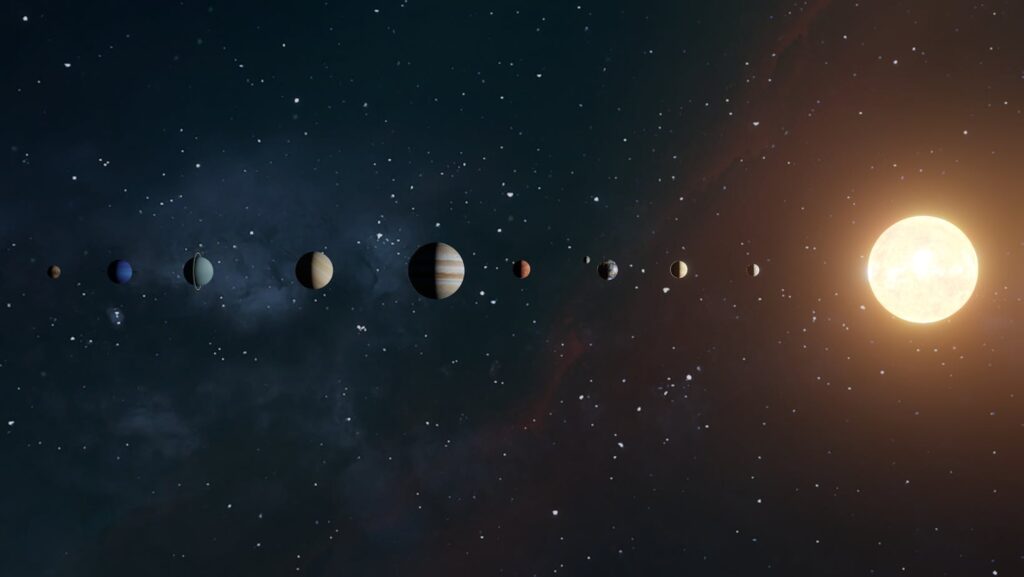Unraveling the mysteries of the universe is no small task, but it all starts with understanding our own cosmic backyard: the solar system. Home to a star, eight planets, and countless smaller celestial bodies, it’s a fascinating realm that continues to captivate scientists and stargazers alike. Selecting and maintaining a grasp on the intricate dynamics and interactions within the solar system is crucial for our exploration of space.
Drawing:zelgp9wo4k8= Solar System

The solar system, marked by an intricate layout, comprises the Sun at its epicenter, eight planets, five dwarf planets, and innumerable moons that travel safely through a complex net. Also included in this colossal space are comets, asteroids, and meteoroids. Understanding the essential components of the solar system is crucial for grasping its complexity and beauty
To illustrate, consider the planets as an example. Closest to the Sun, Mercury, Venus, Earth, and Mars form the terrestrial planets, characterized by rocky surfaces. Beyond the asteroid belt, one finds the gas giants, Jupiter and Saturn, followed by the ice giants, Uranus and Neptune. Each planet, unique in their traits, contributes to the overall framework of the solar system.
Exploration of Planetary Bodies

Mankind’s interest in Mars is fervent, fueled by the planet’s potential for rich sources of information about the solar system’s evolution and the possibility of harboring extraterrestrial life. The Red Planet has been riddled with scientific missions, robotic landers, and rovers designed to study its surface and atmosphere. Noteworthy examples include NASA’s Mars Rover missions, like Spirit, Opportunity, and currently in operation, Perseverance. These exploration devices collect comprehensive data concerning Mars’ geology, climate, and potential for life, offering valuable input for future manned missions.
Beyond Mars, human curiosity extends to the far reaches of the solar system. Jupiter and Saturn especially sparked interest due to their complex gas-based composition and fascinating moon systems. Pioneering efforts like NASA’s Voyager and Galileo missions, followed by Cassini-Huygens, enabled detailed investigations of these giant planets and their respective satellites. Specifically, the Curious Titan, Saturn’s largest moon, with its organic-rich atmosphere, liquid hydrocarbon lakes, and possible cryovolcanoes, provides a compelling area for future exploration endeavors.
Effects of Space Discovery on Earth
Technological Advancements and Scientific Strides

Space exploration escalates technological advancement, encouraging development of sophisticated equipment and techniques. Satellite technology, a direct byproduct of space exploration, revolutionizes communication, forecasts weather, and monitors environmental changes. For example, GPS navigation systems owe their existence to space discovery.
On the scientific front, extensive research into the solar system presents intriguing possibilities for studying extraterrestrial life, influencing biology. The exploration of Mars and the data gathered, hints at previously unconceived notions about life’s existence beyond Earth.
Astrophysics greatly enriches the understanding of celestial mechanisms, relying heavily on space exploration. New theories and models come into existence, ranging from studying the Sun’s impact on Earth’s climate to the gravitational effects of planets. In essence, space discovery contributes significantly to enhancing the pool of human knowledge.
Societal Impact
Societal thinking changes with the expansion of space exploration. Awareness about issues such as climate change, environmental degradation and resource depletion heightens, as images from space provide a stark understanding of Earth’s vulnerability.
Understanding our place in the universe, after deep insights into the solar system, instigates philosophical inquiries. Humans contemplate their role within the cosmos and their responsibilities towards this planet. Space discovery, therefore, serves as a catalyst for societal evolution.
Moreover, international cooperation amplifies in the sphere of space exploration. Missions to Mars, for example, witness global collaborations in a bid to bring humanity closer to understanding the alien world.
Impact of Planetary
Diving into the solar system’s structure, we’ve seen the Sun’s vital role and the extensive planetary explorations. These missions have not only expanded our understanding of the cosmos but also brought about significant changes on Earth. The technological leaps in satellite technology and GPS are testament to this. The quest for extraterrestrial life and advancements in astrophysics have sparked scientific curiosity and innovation.

